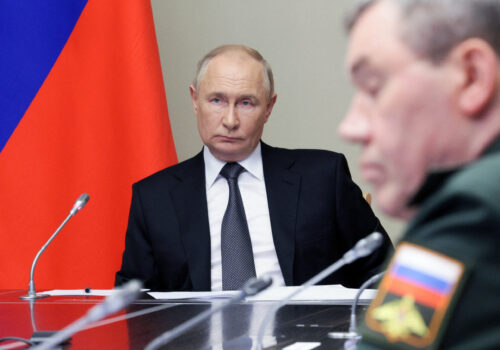When Kamala Harris sat down with CNN’s Dana Bash last month, Bash asked a question: “Would you withhold some U.S. weapons shipments to Israel? That’s what a lot of people on the progressive left want you to do.”
Harris sidestepped the question, talked about a ceasefire, and ultimately said that she would not change course from the Biden administration’s policy of arming Israel as its war on Gaza enters its 11th month.
But polls of the American voting population show that she’s ignoring more than just the “progressive left”: A majority of voters support ending arms transfers to Israel, and support for an arms embargo is growing.
“The reality is that the public is far more in favor of stopping arms sales to Israel than opposed,” Yousef Munayyer, head of the Palestine/Israel Program at Arab Center Washington D.C., told The Intercept. He pointed to a June poll from CBS that showed 61 percent of all Americans said the U.S. should not send weapons to Israel, including 77 percent of Democrats and nearly 40 percent of Republicans.
Poll results have been consistent for months.
Since the start of the war in Gaza, a majority of Americans have expressed support for some form of restrictions on the U.S. sending weapons to Israel in repeated public surveys. Americans are even more overwhelmingly in favor of a ceasefire.
Among the most consistent string of polls on the issue of weapons transfers to Israel has come from CBS News, which partnered with YouGov to carry out its survey. About two weeks after the October 7 attacks by Hamas, as Israel’s bombardment had already killed more than 2,000 civilians in Gaza, a CBS poll of more than 1,800 Americans found that 52 percent of American adults said the U.S. should not send weapons to Israel. The totals included large majorities among both Democrats and independents, and 43 percent of Republicans.
In April, CBS News/YouGov asked the same question in a new poll and found that an even larger number of Americans (60 percent), including 68 percent of Democrats, said they felt the U.S. should not send arms to Israel. The poll was conducted days after an Israeli strike killed seven aid workers in a clearly marked World Central Kitchen convoy.
And in June, when more than 30,000 Palestinians were killed and as Israel continued its operations in Rafah where many of Gaza civilians had been sheltering, spurring the “All Eyes on Rafah” social media campaign, a third CBS News poll seemingly solidified Americans’ opposition to military aid to Israel with 61 percent of American adults calling for a halt on weapons transfers to Israel, including 77 percent of Democrats.
Stopping arms transfers also polls highly in key swing states, according to recent polls.
A poll published this week by the libertarian think tank Cato Institute found that the majority of likely voters in some Rust Belt swing states are in favor of conditioning military aid to Israel or are against sending aid altogether. The tallies showed 61 percent in Wisconsin expressing support, along with 56 percent in Michigan and 51 percent in Pennsylvania.
Another poll from August, commissioned by the Institute for Middle Eastern Understanding Policy Project and conducted by YouGov, showed that a majority of voters in Pennsylvania (57 percent), and a significant share of voters in swing states Arizona (44 percent) and Georgia (34 percent), said they would more likely vote for Harris if the U.S. withholds arms to Israel.
An additional swing-state focused poll earlier this year, commissioned by Americans for Justice in Palestine Action and conducted by YouGov in May, also found 2 in 5 Democrats and independents in Wisconsin, Arizona, Michigan, Pennsylvania, and Minnesota said that an immediate and permanent ceasefire and conditioning of aid to Israel would make them more likely to vote for then-candidate Joe Biden.
“This is not a ‘progressive left’ issue — the vast majority of Democrats support ending arms sales to Israel,” Munayyer said. “This is a mainstream position, as I think it should be for any sensible person watching what is happening in Gaza, that we should not continue funding this, we should not continue supporting this.”
Despite the popularity of cutting Israel off from American weapons, the Biden administration has continued to pump billions in military aid, including thousands of 2,000-pound bombs, to Israel, approving a $20 billion weapons package just last month. His administration has ignored calls from Democratic senators to halt aid, as well as credible evidence of human rights violations committed by the Israeli military. Biden briefly halted transfer of munitions in May as Israel prepared for an offensive in Rafah where 1 million Palestinians had sought refuge, but later reversed his position after pressure from the pro-Israel lobby within the party. At the Democratic National Convention, party officials denied a main-stage speaker slot from more than 200 “Uncommitted” delegates and ceasefire delegates committed to Harris who are in favor of an arms embargo. Harris’s CNN interview seemingly dampened the cautious optimism of those who hoped for her to depart from her boss’s policies.
Even with the renewed energy from across the Democratic party since Biden dropped out of the race, Harris continues to be in a dead heat with former President Donald Trump. This week’s New York Times and Siena College national poll had 47 percent of likely voters supporting Harris, with Trump garnering 48. Both candidates are expected to be asked about their approach on the war in Gaza during Tuesday’s highly anticipated debate on ABC.
The most commonly cited U.S. law by proponents of an arms embargo has been the Leahy law, enacted in 1997, which prohibits the State Department from sending military aid to any foreign security force that is found to violate human rights law. Also, in March, a group of Democratic senators, including Bernie Sanders, I-Vt., and Chris Van Hollen, D-Md., cited the Foreign Assistance Act of 1961, which prohibits military aid to countries that block humanitarian aid. They were responding to evidence and allegations that Israeli Prime Minister Benjamin Netanyahu’s Cabinet had been interrupting U.S. humanitarian aid from entering Gaza.
The polling data has accumulated for many months. A poll from left-wing think tank Data for Progress, showed in December that 63 percent of voters agreed that military aid should be conditioned on whether Israel meets the U.S. standard for human rights. In March, 52 percent of Americans said that Biden should halt weapons transfers to Israel, according to a poll by the Center for Economic and Policy Research.
In June, another Data for Progress poll found that a majority of Americans (53 percent) supported withdrawing military aid from Israel if the country does not accept a ceasefire deal. Seventy percent of Democrats and 53 percent of swing voters supported the measure. The poll was conducted about one month after Netanyahu had rejected a ceasefire deal, even after Hamas had accepted its terms.
A poll of more than 2,000 Americans taken by the Arab American Institute in the period between the Republican and Democratic national conventions in late July and early August showed that support for Harris would grow from 44 to 49 percent if she were to suspend arms shipments and withhold diplomatic support for Israel until there was a ceasefire and withdrawal of forces from Gaza.
More recently, an August poll from the Chicago Council on Global Affairs found that a majority (53 percent) of Americans, including 68 percent of Democrats, believe the U.S. should restrict military aid to Israel so it cannot use the aid in military operations against Palestinians. An earlier July poll from the Chicago-based think tank found that such support for restricting military aid was more favorable among people of color, including respondents who were Black, Hispanic, Asian, or Hawaiian/Pacific Islander. The August poll did however find that 60 percent of Americans would support military aid to Israel until the hostages taken by Hamas are freed.
Support for a ceasefire was considered a controversial demand among U.S. lawmakers for months but has now become a regular talking point among Democratic leaders, though critics say it’s often used to deflect from U.S. responsibility for the ongoing war on Gaza. Since the beginning of the year, it has also been consistently popular among Americans. As early as January, an Associated Press poll found that half of Americans felt Israel had gone too far in its war, including 63 percent of Democrats.
The June Data for Progress poll showed the majority of Americans (64 percent) supported a permanent ceasefire deal and an Economist/YouGov poll in May found that same number in support of a ceasefire. The August Chicago Council on Global Affairs poll said the majority of Americans should pressure Israel into a ceasefire deal, with a plurality of respondents saying the U.S. should reduce arms shipments to do so.
A series of Gallup polls that showed Americans’ attitudes toward Israel’s military operations in Gaza also show a gradual progression toward disapproval for the war. While in November, 50 percent of Americans said they support Israel’s war in Gaza, among that total were 63 percent of Democrats who expressed disapproval. About four months later, Americans had shifted with the majority (55 percent) saying they disapproved of Israel’s operations, according to a March Gallup poll. Although a June Gallup poll showed disapproval dropping to 48 percent, opposition to the war stood firm among Democrats (77 percent) and independents (66 percent).
An outlier among polls that asked Americans about sending arms to Israel was a March survey from the Pew Research Center, which found that only 35 percent of Americans were opposed to military aid. However, the poll also showed a plurality of Democrats (44 percent) opposed military aid to Israel and a majority of liberals (54 percent).
Earlier this month, the United Kingdom broke from the U.S. and announced it would ban some of its weapons transfers to Israel. However, the number is minimal, suspending 30 of its 350 arms licenses. Other countries to suspend military support to Israel include Italy, Belgium, Canada, the Netherlands, and Spain, which also banned ships from carrying weapons to Israel from docking in its ports.
After Harris’s CNN interview, Matt Duss, executive vice president at the Center for International Policy and former foreign policy adviser for Sanders, told The Intercept that the issue of restricting arms to Israel did not begin with October 7 but has been a popular move within the party for much longer.
“This is not new, this is not a radical departure — this is a consistent trend we’ve seen for years among Democratic voters,” Duss said.
Before October 7, concerns largely centered around Israel’s occupation of the West Bank, continued settlement expansion, and evidence of human rights violations by the Israeli military in the occupied territory. In 2020, then candidates for president Bernie Sanders, Elizabeth Warren, Pete Buttigieg, and Julian Castro at least signaled support or interest in conditioning aid so that it wouldn’t support further annexation of land in the occupied West Bank.
And on the 2020 election night, J Street, a liberal Jewish lobbyist group, conducted a poll that showed 57 percent of American Jews would want to restrict military aid to ensure it cannot be spent on annexation. In 2021, J Street also backed a Democrat-backed bill that would have prevented aid to Israel to be used on human rights abuses of Palestinians, destruction of Palestinian property, or displacement of Palestinians from their land.
“I’m not saying everyone should just make their policy decisions based on what the polling says on any given date,” Duss said. “But this is a consistent trend, this is what Democrats clearly think.”
The post Most Americans Want to Stop Arming Israel. Politicians Don’t Care. appeared first on The Intercept.











